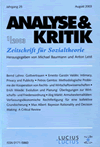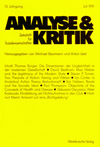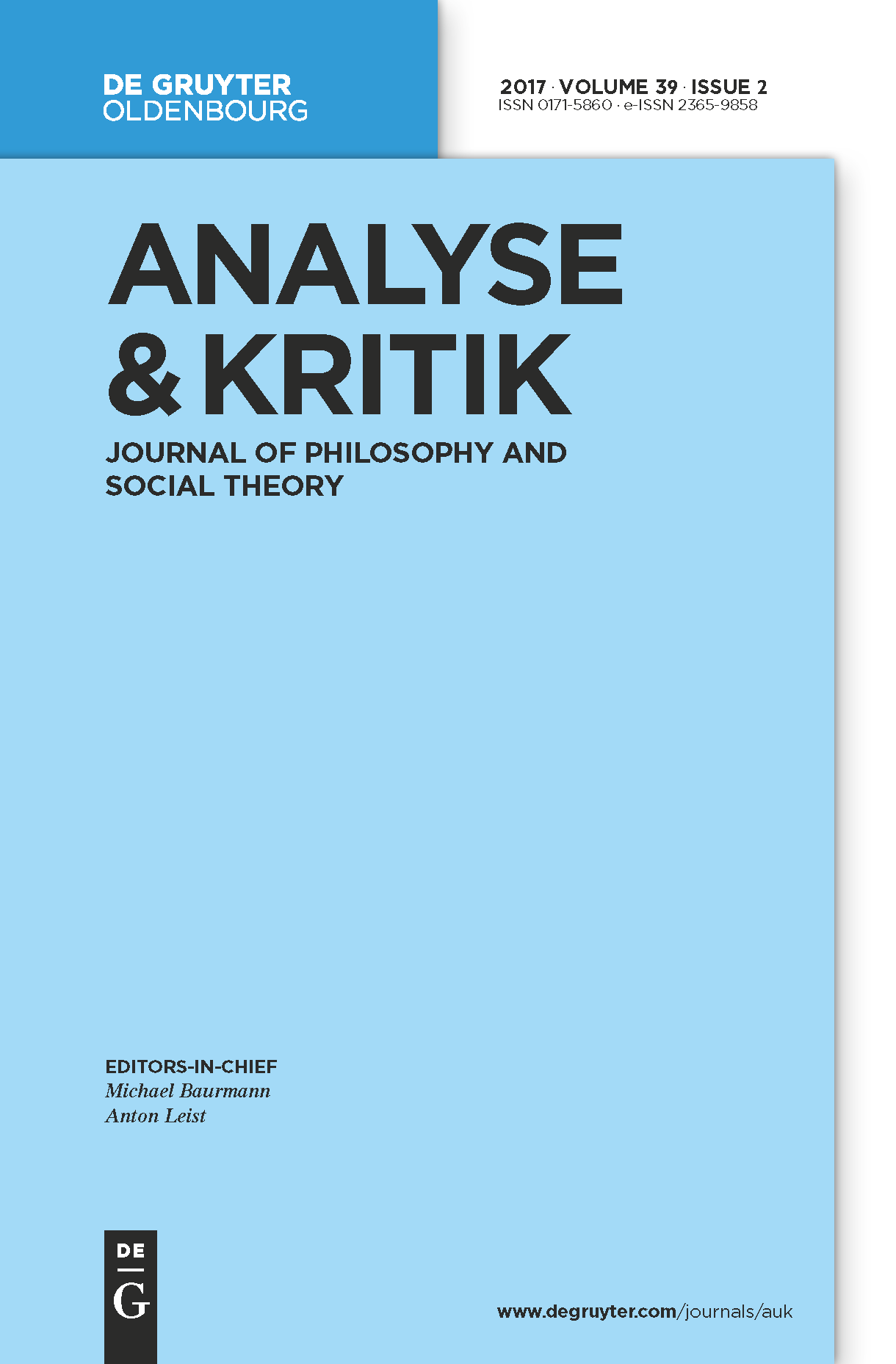Suchergebnisse
"Richard Rorty"
Titel: Rawls and the Socratic Ideal
Autor: Kai Nielsen
Seite: 67-93
Abstract: John Rawls's recommendation that political philosophy should be kept free of metaphysics has recently come under attack by Jean Hampton. According to her philosophy as a Socratic quest has to orient itself by radical probing and that unavoidingly involves us in metaphysical commitment. Non-Socratic philosophy in the later Rawls, she claims, reduces itself to a mere modus vivendi. In defending Rawls the article makes clear how Hampton underrates the method of reflective equilibrium. Rawls makes a rationally reconstructed use of the Socratic ideal, that can be turned not only against Hampton's critique of Rawls, but also against its relativist appropriation by Richard Rorty.
Titel: A Reply to Six Critics
Autor: Richard Rorty
Seite: 78-98
Abstract: Professors Maclntyre and Rosenberg are more inclined than I to believe that 'philosophy' names a natural kind - a distinctive sort of inquiry with a continuous history since the Greeks. Their criticisms of my book reflect this disagreement. Mr. Montefiore brings to light various ambiguities in my use of such terms as "edifying philosophy" and "Continental philosophy". His criticisms make good points against the concluding portions of Philosophy and the Mirror of Nature. Professors Bennett and Turnbull rightly say that I have over-simplified the current situation in Anglo-Saxon analytic philosophy, but I would hope that these simplificatons do not affect the gist of my argument. Dr. Köhler very helpfully traces connections between my metaphilosophical views and my discussion certain first-order issues.
Titel: Richard Rorty - Two Philosophers or one?
Autor: Alan Montefiore
Seite: 83-96
Abstract: Rorty makes a number of broadly convergent distinctions between different types of philosopher or philosophy. His own expressed view - or apparent view - that what he calls abnormal or edifying discourse is parasitically dependent on a prior acceptation of the norms of normality is fundamentally, even 'foundationally', correct. Any too reckless or too persistently sustained defiance of these norms or of this dependence is bound to involve a refusal of various orders of responsibility; including perhaps both moral and political responsibilities. There can, of course, be no straightforward proof that Rorty's texts, stimulating and fruitful as they indisputably are, involve any of these irresponsibilities; indeed, he would no doubt accept the gist of much of the argument which seeks to make them explicit. It is nevertheless worrying to find him saying the things that he does say about the allegedly unbridgeable differences between 'continental' and 'analytic' philosophy; and though he might reply that one should not here take what he says as being the expression of a view on a matter of so-called fact, the factual inaccuracies of the views that he might 'normally' be taken to be expressing here are only too likely to be more misleading than fruitful, more harmful than harmless.
Titel: Der intersubjektive Faktor. Bemerkungen zu Richard Rortys erkenntnistheoretischem Behaviorismus
Autor: Wolfgang R. Köhler
Seite: 97-113
"Der Erkennende vermeidet die Selbsterkenntnis und lä ßt seine Wurzeln in der Erde stecken." Nietzsche
Abstract: The following article is only in part a review of Rorty's "Philosophy and the Mirror of Nature". First I sketch the development of the two leading metaphors, which Rorty considers as being central for epistemology, namely the mirror of nature and the eye of the mind. Then I try to bring out the antirealist implications of Rorty's socalled "epistemological behaviorism" and to make sense of his slogan that truth is merely warranted assertability which in my view seems not to be in line with his favouring truth-conditional semantics. Thirdly I point to some possible consequences for the social sciences of using the antirealist "criterial" semantics of the later Wittgenstein, one of Rorty's heroes.
Titel: Richard Rorty and the American Philosophical Scene
Autor: Robert G. Turnbull
Seite: 223-238
Abstract: Richard Rorty's assessment of the American philosophical scene is unduly cynical. Part of the reason for this seems to lie in his recognition (in Philosophy and the Mirror of Nature) of the incoherence of "grounding" a linguistic or conceptual scheme on a "given", but proceeding, nevertheless, to think of representation and truth as requiring conformity to a "given". He, therefore, fails to appreciate the unity and seriousness of American philosophers who, abandoning the "given", are working with some success on plausible accounts of representation and truth. Surprisingly, neither in his article nor his book does he attend to the remarkable increase in sophistication and serious research on the part of historians of philosophy and historians of science. Both in serious work on representation and truth and in historical research there is more rapprochement between American and Continental philosophers than Rorty seems prepared to credit.
Titel: Philosophy and its History
Autor: Alasdair MacIntyre
Seite: 102-113
Abstract: Richard Rorty argues that the present state of analytic Philosophy is the result of the collapse of the logical empiricist program. But most of the characteristics of analytic philosophy which Rorty ascribes to that collapse predated logical empiricism. The historical explanation of the present state of philosophy must begin not later than with the schism between philosophy and the other disciplines in the seventeenth and eighteenth centuries. To begin then leads to a different view of how philosophical problems are generated.
Titel: Zur Lage der Gegenwartsphilosophie in den USA
Autor: Richard Rorty
Seite: 3-22
Abstract: Analytic philosophy has taken for granted an account of the history of philosophy which jumps straight from Kant to Frege, leaving out Hegel and most of the nineteenth century. Such an understandig (e. g. , that of Reichenbach's Rise of Scientific Philosophy) depends upon viewing philosophy as the solution of certain discrete and specific "problems" raised by e. g. , discoveries in physics or mathematics. But the rejection of traditional positivist doctrines (those invoked by Reichenbach) brought about by the work of Wittgenstein, Quine, and others, makes this latter conception of philosophy difficult to sustain. Consequently, analytic philosophy has become a movement without a clear self-image and sense of mission. Its old ideological roots have been cut, and it now sustains itself through a sense of professionalism rather than by a sense of cultural or historical role. However, it still retains the Reichenbachian account of the history of philosophy. This has led to problems in American philosophy departments, particularly an unwillingness to regard Hegel, Marx, Nietzsche, Heidegger, and other "Continental" figures as being "really philosophers" and thus an unwillingness to include them in the curriculum.
Titel: Rorty’s Rejection of Philosophy
Autor: Brian Leiter
Seite: 23-30
I argue that the real puzzle about Richard Rorty’s intellectual development is not why he gave up on ‘analytic’ philosophy—he had never been much committed to that research agenda, even before it became moribund—but why, beginning with Philosophy and the Mirror of Nature (PMN), he gave up on the central concerns of philosophy going back to antiquity. In addition to Rorty’s published works, I draw on biographical information about Rorty’s undergraduate and graduate education to support this assessment, and contrast his rejection of philosophy with Nietzsche’s. Many contemporary philosophers influenced by Quine’s attack on the analytic-synthetic distinction and Sellars’ attack on ‘the Myth of the Given’ (the two argumentative linchpins of PMN) did not abandon philosophical questions about truth, knowledge, and mind, they just concluded those questions needed to be naturalized, to be answered in conjunction with the empirical sciences. Why didn’t Rorty go this route? The paper concludes with some interesting anecdotes about Rorty that invite speculative explanations.
Titel: Richard Rorty, Homo Academicus Politicus
Autor: Loren Goldman
Seite: 31-68
This article explores Richard Rorty’s status in academic political theory in the decades after his conscious departure from disciplinary philosophy. Rorty found a receptive audience in this pluralistic field, and he became a point of orientation in a number of ongoing, research-agenda driving conversations, if often as an extreme example against which interlocutors could define themselves. In like fashion, Rorty refined his own self-conception as a patriotic liberal ironist in the course of his political theoretical engagements. I offer a sketch of political theory’s landscape as a contrast to the reductivism and esotericism Rorty criticized in disciplinary philosophy, and survey his presence in the field over the years substantively, qualitatively, and quantitatively.
Titel: Kicking the Philosophy Habit: Richard Rorty’s Clarion Call and the Cultural Politics of the Academic Left
Autor: Gregory Jones-Katz
Seite: 71-95
In the late 1970s and early 1980s, Richard Rorty advocated that his confréres kick the ‘philosophy habit’—that is, adopt a post-positivist, post-metaphysical style of interpretation. Philosophers largely ignored Rorty’s clarion call. Unburdened by the kind of Selbstverständnis of scholarly mission held by most analytics, members of departments of literature instead became the most important advocates for reading literature philosophically during the last two decades of the twentieth century. Though the academic Left, especially practitioners of ‘theory’, largely celebrated and encouraged this development, Rorty, in the late 1990s, came to view it as harmfully elevating ‘cultural politics’ above ‘real politics’, which would ultimately lead to the abandonment of civic responsibilities. While heavy-handed and partial, Rorty’s critique of the uses of philosophy by literary critics was not only perceptive, but can be helpful for understanding how the contemporary academic Left might move forward as well.
Titel: Pragmatist Transcendence in Rorty’s Metaphilosophy
Autor: Nicholas H. Smith and Tracy Llanera
Seite: 97-116
This article argues that a pragmatist ambition to transcendence undergirds Richard Rorty’s metaphilosophy. That transcendence might play a positive role in Rorty’s work might seem implausible given his well-known rejection of the idea that human practices are accountable to some external, Archimedean standpoint, and his endorsement of the historicist view that standards of rationality are products of time and chance. It is true that Rorty’s contributions to epistemology, philosophy of mind and metaphysics have this anti-transcendentalist character. But in his metaphilosophy, Rorty shows great respect for pre-philosophical impulses aimed at transcendence of some kind, in particular the romantic (and indeed religious) experience of awe at something greater than oneself, and the utopian striving for a radically better world. These impulses do not disappear in Rorty’s metaphilosophy but are reshaped in a pragmatist iteration of transcendence which, we argue, can be characterised as horizontal (rather than vertical) and weak (rather strong). We use this characterization to distinguish Rorty’s metaphilosophy from other accounts that share a postmetaphysical ambition to transcendence.

Social Theory Today. 30 Years of Analyse & Kritik
2008 (30) Heft 2
Editorial
The founders and editors of this journal who got together thirty years ago to deliberate on its programme, had been influenced both by the critical and emancipatory aims of the Marxist tradition and by the rigour and sophistication of analytic philosophy. At the same time they were also dissatisfied with both traditions. They were repelled by the sectarian sides of Marxist economics, frustrated by the inscrutable language of the Hegelian Marxists and puzzled by the lack of explicit normative arg...

ohne Titel
1981 (3) Heft 1
Editorial
1. Zur programmatischen Konzeption von ANALYSE & KRITIK gehört der Versuch, eine Verbindung zwischen der Tradition der analytischen Philosophie und Wissenschaftstheorie und den kritischen Sozialwissenschaften herzustellen. Diese Absicht setzt voraus, daß die analytische Philosophie und Wissenschaftstheorie zumindest tendenziell als ein einheitliches Gebilde betrachtet werden kann, das von integrierenden Prinzipien und einer fortschreitenden Problemlösungstradition geprägt wird. Nur wenn das ...

Rorty and Paradigm Change in Philosophy
2019 (41) Heft 1
Editorial
Three years after its foundation, in 1981, this journal presented a contribution by Richard Rorty in German translation, which was republished as ‘Philosophy in America Today’ in another journal the same year and included in Rorty’s first article selection Consequences of Pragmatism (1982). A lively debate on the article and Rorty’s Philosophy and the Mirror of Nature (1979) ensued and drew a lengthy ‘Reply to six critics’ from Rorty. These diversified and historically symptomatic re...